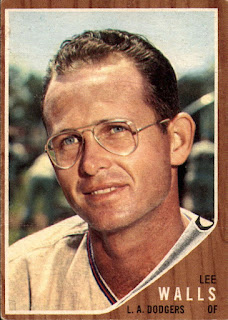10/2/62 gave us the longest nine-inning game in history--up to that point, at least (but the record set in this game held up for more than forty years)--as it took four hours and eighteen minutes to bring the game to a conclusion.
It started out as a pitcher's duel between Don Drysdale (working on two days rest) and Jack Sanford (who uncharacteristically struck out the side in the first innng). The Giants scored a run in the top of the second when Felipe Alou doubled home Orlando Cepeda, but Drysdale--working much more deliberately than usual--turned back potential Giants rallies in the third and fourth innings. Sanford dodged a bullet in the fourth when Duke Snider's screaming liner to center field was run down by Willie Mays with two men on base.Drysdale finally weakened in the top of the sixth, walking Tom Haller and leaving a fastball too over the plate to Jose Pagan, who smoked a grounder past Tommy Davis at third for a double. Sanford was up next, and after two unsuccessful bunt attempts, slapped one off Drysdale's glove; Big D ran after the ball, whirled and threw a sinker to home that bounded off catcher Johnny Roseboro's shinguards as Haller lumbered home. The ball got away, allowing the Giants' catcher to score, and the floodgates opened: before the inning was over, Drysdale had been chased and the Giants had opened up a 5-0 lead.
But this wasn't anything close to your normal sixth inning, as the Dodgers were about to prove. Jack Sanford walked Jim Gilliam--and received one of the quickest "quick hooks" in history. As things would turn out, Giants' manager Al Dark had led with his chin, bringing in his erstwhile ace reliever, Stu Miller, as the "first responder." (He certainly wouldn't be the last!
Duke Snider doubled, sending Gilliam to third; Tommy Davis then hit a drive to dead center field that Willie Mays grabbed at the wall, quite possibly preventing a home run: Gilliam scored and Snider made it to third, getting the Dodgers their first run in three days.
Wally Moon walked; Frank Howard then rifled a single to left that was hit so hard that Moon had to scamper as fast as he could so as not to be thrown out at second. It was now 5-2 Giants.
Dark replaced Miller with Billy O'Dell. which did not "spell relief." Doug Camilli singled to load the bases, and then O'Dell hit Andy Carey with a 2-2 pitch to force in another run and bring up Lee Walls to bat for Ed Roebuck.
Walls, acquired in the off-season from the Mets, was a kind of poor man's version of Frank Howard: not quite as big (6'3" instead of 6'7") but equally bespectacled. He was supposed to provide some power off the bench against lefties, but he'd failed to hit a single homer all season. O'Dell made him look bad on two curve balls, but on the 1-2 pitch he came with a fastball--which Walls promptly hit off the left-center field wall to clear the bases, giving LA a 6-5 lead.That brought in Don Larsen, who gave up a single to Maury Wills to score Walls. Maury stole his 101st base, but Willie Mays threw him out trying to advance to third after Johnny Orsino's throw skipped into center field. Jim Gilliam, who'd started things off with a walk nearly three-quarters of an hour earlier, then flew out to end the inning--but the Dodgers had gotten off the deck for seven runs and now led 7-5.
Of course, they couldn't help but squander the lead in the very next inning, as Ron Perranoski proved distressingly hittable. Things got dicey enough that Walt Alston wound up bringing in the inhabitant of the team's doghouse, Stan Williams, in order to stop the bleeding. Williams did so, but the Giants got two in the inning to knot the game at 7-7.
Stan pitched a strong ninth as well, striking out a couple of batters and finally looking like the pitcher he was back in 1960. In the bottom of the inning, Al Dark would match his total of pitchers in a single inning (4) that he'd already used in the sixth--in a desperate attempt to keep LA from scoring the game-winning run. Here's how it went: Bobby Bolin walked Maury Wills; Dick LeMay walked Jim Gilliam; Gaylord Perry (you remember: "Young Gaylord") was brought into counter Alston's move to bat righty-hitting Daryl Spencer for Duke Snider; Spencer sacrificed, putting the winning run just ninety feet away.
Then Mike McCormick relieved Perry, which left folks scratching their heads. "Why bring in a lefty to face Tommy Davis?" some folks wondered. Why, all the better to issue the free pass to load the bases and allow the southpaw to face the slumping Ron Fairly (a lefty batter). And sure enough, McCormick got two quick strikes on Ron.
But Fairly connected on the 0-2 pitch, driving a liner into center field. Mays raced to his left to catch it, but his throw home was not in time to catch Wills, who scored the winning run to force a winner-take-all game the following day. Final score: Dodgers 8, Giants 7.
(How often does a manager use four pitchers in an inning two ties in a game? It's a question for the folks at Baseball Reference to answer exactly, but the answer must be: not very darned often. (The other question to ask: what's the team won-loss record when it has to resort to using four pitchers in an inning? Another question for BB-ref, and another that we can likely summarize in three worlds--not very good!)
SEASON RECORDS: LAD 102-62; SFG 102-62

